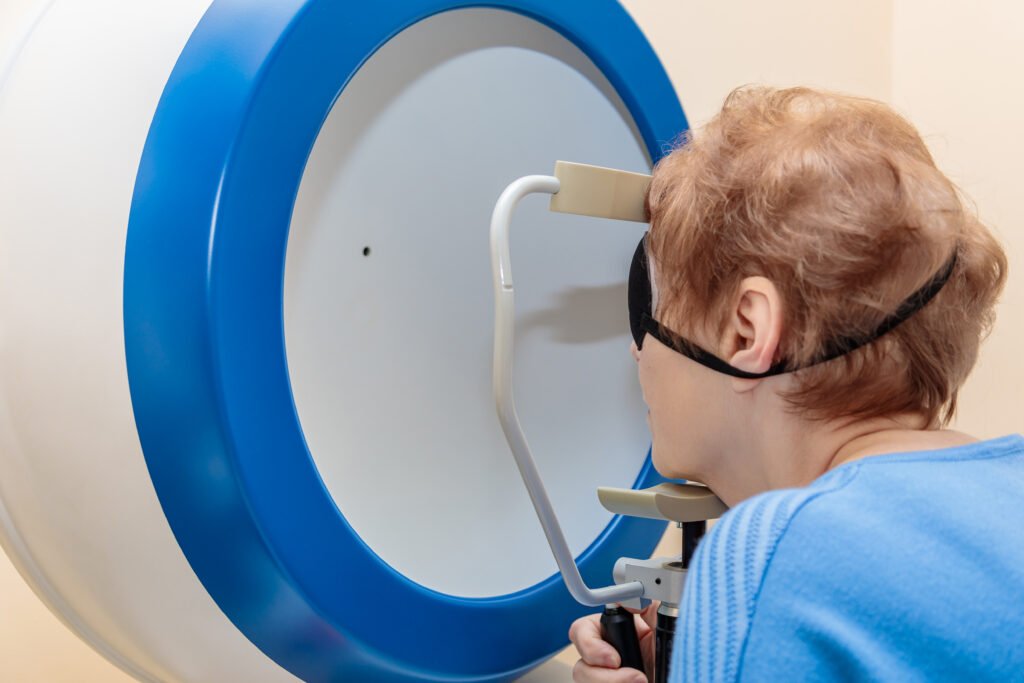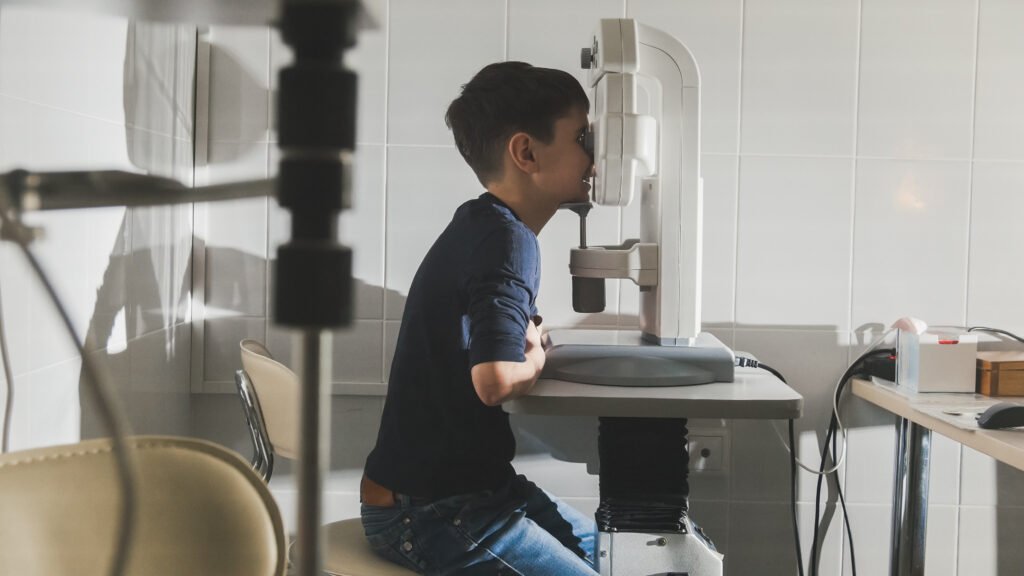Glaucoma is a major eye condition that affects millions of people of various age worldwide. It is a leading cause of irreversible blindness, making it crucial to understand what causes Glaucoma condition, glaucoma is a common eye disease characterized by increased pressure in the eye, leading to your optic nerve damage and potential vision loss eventually. It is often referred to as the “silent thief of sight” because the symptoms are usually not noticeable until the disease has progressed. In this article, we will explore the various factors that contribute to the development of glaucoma and the importance of early detection and treatment.
Understanding What causes Glaucoma

By : Yurich32/ unlimphotos
Glaucoma refers to a group of eye diseases that damage the optic nerve, leading to vision loss and potential blindness if left untreated. The major factor of what cause glaucoma is an increase in intraocular pressure (IOP), the pressure inside the eye. However, other factors can also contribute to the development of this condition.
Role of Intraocular Pressure (IOP)
High intraocular pressure is one of the major and primary risk factor for what causes glaucoma. The eye produces a clear fluid called aqueous humor, which flows through the eye and drains out through a mesh-like channel called the trabecular meshwork. When this drainage system becomes blocked or does not function properly, the fluid cannot drain effectively, resulting in an increase in IOP. Elevated IOP puts pressure on the optic nerve, causing damage over time.
Other Contributing Factors
While high intraocular pressure is a significant factor, there are other factors which are responsible for what causes Glaucoma and contribute to the development of glaucoma. These include:
Age
Advancing age is a common risk factor for what causes glaucoma. As we get older, the risk of developing glaucoma increases. Therefore, regular eye exams become even more essential as we age.
Family History
Another common factor of what causes Glaucoma is If you have a family history of glaucoma, your risk of developing the condition is higher. Genetic factors can play a role in the occurrence of glaucoma, so it’s crucial to inform your eye doctor about any family history of the disease.
Ethnicity
Certain ethnic groups, such as African-Americans, Hispanics/Latinos, and Asians, have a higher risk of developing certain types of glaucoma this is another major factor of what causes Glaucoma. The specific reasons behind these disparities are still being studied.
Medical Conditions
Certain medical conditions, such as diabetes, hypertension (high blood pressure), and hypothyroidism are another factors of what causes Glaucoma, can increase the risk of glaucoma. It is important for individuals with these conditions to have regular eye examinations.
Eye Trauma
In some cases, trauma to the eye can lead to glaucoma. Whether it’s from a sports injury, accident, or other forms of trauma, the damage to the eye can disrupt its normal fluid flow, resulting in increased intraocular pressure which contribute in the factors of what causes Glaucoma.
Importance of Early Detection and Treatment
Understand what causes Glaucoma and Detecting glaucoma early is crucial for preventing vision loss and managing the condition effectively. Unfortunately, glaucoma is often called the “silent thief of sight” because it typically does not cause symptoms in the early stages. Some of the common factors of what causes Glaucoma eye trauma, medical conditions, family history and many more. Regular eye exams, including measurements of intraocular pressure and evaluation of the optic nerve, can help detect glaucoma before significant damage occurs.
Early treatment can help control intraocular pressure and slow the progression of the disease. Treatment options include eye drops, oral medications, laser therapy, and surgery, depending on the severity and type of glaucoma. The key is to work closely with your eye care professional to develop a personalized treatment plan.
Your partner to a better vision
When it comes to your know What causes glaucoma and how to diagnosis at the right time finding the right healthcare partner is crucial for a successful outcome. Consulting a doctor is highly recommended to ensure you make the best choice for your needs and explore what causes Glaucoma for different age groups. Often, patients have thoughts like “What are the best glaucoma specialist near me?” or “best eye hospital near me?” If you find yourself in this dilemma, Then choosing Bhanoo Eye Hospital in Chandigarh is one of the most effective choice for your successful cataract surgery recovery journey. They have a team of highly skilled and experienced glaucoma specialists in Chandigarh who can provide top-notch eye care. Consider reaching out to them for the best eye treatment in Chandigarh for glaucoma, Regular eye exams are crucial in diagnosing glaucoma, as the condition often develops without any noticeable symptoms. Treatment options may include eye drops, oral medications, laser therapy, or surgery, depending on the severity of the disease.
Conclusion
Glaucoma is a complex eye condition with various contributing factors if what causes Glaucoma. While high intraocular pressure is the primary cause, age, family history, ethnicity, medical conditions, and eye trauma can also increase the risk. Regular eye exams and early detection are vital for preventing vision loss and managing the disease effectively. If you have any concerns or a family history of glaucoma, make sure to schedule an appointment with an eye care professional to protect your vision and overall eye health, consult with your eye Care professional to know exactly what causes Glaucoma .It is important to understand that glaucoma requires long-term management to preserve vision. Regular follow-ups with an ophthalmologist and adherence to prescribed treatments are essential for maintaining eye health and preventing further damage caused by glaucoma.
FAQ’s
What cause of glaucoma majorly?
Ans: Glaucoma is a complex eye condition characterized by increased pressure within the eye that can lead to damage of the optic nerve and potential vision loss. While there are various factors contributing to its development, the major cause of glaucoma is an imbalance in the production and drainage of fluid in the eye, known as aqueous humor.
Under normal circumstances, the eye continuously produces and drains a clear fluid called aqueous humor. However, in individuals with glaucoma, there is either an excessive production of this fluid or a blockage in its drainage system. As a result, the intraocular pressure rises, leading to damage to the delicate optic nerve fibers.
Several risk factors can increase the likelihood of developing glaucoma, such as advancing age, family history of the condition, certain medical conditions like diabetes, and chronic use of steroid medications. Early detection and regular eye examinations are crucial in managing and treating glaucoma effectively. Timely intervention can help control intraocular pressure and prevent further damage to the optic nerve, preserving vision for longer periods.
Who gets glaucoma the most?
Ans;
Glaucoma is a progressive eye condition that can affect anyone, but certain groups of people have a higher risk. The primary factor is age, with individuals aged 60 and above being more prone to developing glaucoma. Additionally, African-Americans and individuals of Hispanic descent are more likely to get glaucoma compared to other ethnic groups.
Other risk factors include a family history of glaucoma, as the condition can be hereditary. People with certain medical conditions such as diabetes, high blood pressure, and heart disease are also at an increased risk of developing glaucoma. Certain eye conditions like severe nearsightedness or previous eye injuries can contribute to the likelihood of developing glaucoma as well.
It is important to note that while these groups may be more susceptible to glaucoma, anyone can be affected. Regular eye exams and early detection are crucial in the prevention and management of glaucoma, regardless of an individual’s risk factors.
Can glaucoma permanently cured ?
Glaucoma is a common eye condition that affects millions of people worldwide. It occurs when there is damage to the optic nerve, usually caused by increased pressure within the eye. Many individuals diagnosed with glaucoma wonder if it is curable.
Unfortunately, glaucoma is a chronic condition, and at present, there is no known cure. However, the progression of glaucoma can usually be managed and slowed down with appropriate treatment. Early detection and timely intervention are crucial to preserve vision and prevent further damage.
Treatment options for glaucoma include eye drops, oral medications, laser therapy, and sometimes surgery. These interventions aim to control eye pressure and prevent optic nerve damage. Regular monitoring by an ophthalmologist is necessary to assess the effectiveness of the treatment and make any necessary adjustments.
While a cure for glaucoma is not currently available, proper management and adherence to treatment can significantly slow down the progression of the disease and maintain good vision for a longer period of time.
What foods help glaucoma?
What foods help glaucoma? Glaucoma, a serious eye condition, can be aided by making conscious dietary choices. Incorporating specific nutrients can potentially promote eye health and help alleviate some symptoms associated with glaucoma. Antioxidant-rich fruits and vegetables, such as spinach, kale, carrots, and berries, are highly recommended due to their potential protective effects on eye tissues. Additionally, consuming foods high in omega-3 fatty acids, like salmon, mackerel, and flaxseeds, may have a positive impact on eye health and potentially reduce glaucoma risk. Green tea, thanks to its antioxidant and anti-inflammatory properties, is another potential addition to a glaucoma-friendly diet. However, it is important to consult with a medical professional or a nutritionist for personalized advice and to understand how specific foods may interact with any ongoing glaucoma treatments.



